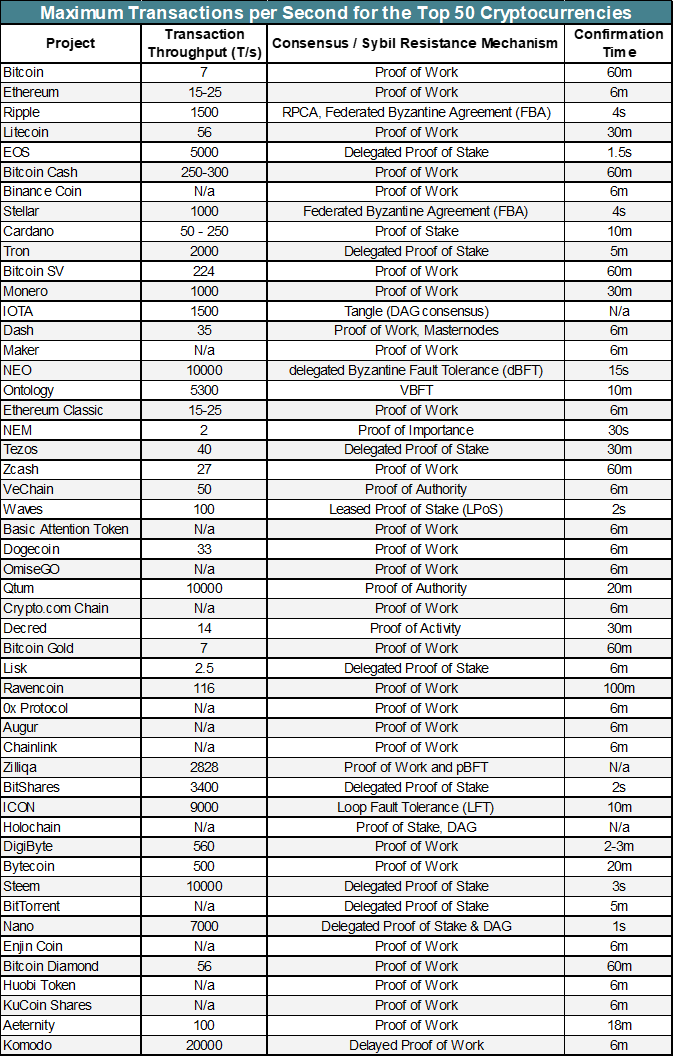There are numerous important factors that investors should consider when evaluating any given cryptocurrency.
The team behind each project probably has the most to do with how successful it will be in the long run. But besides that, what else do you need to know before buying in?
Here are the top things I look at:
- Addressable market and use cases
- Business model and token economics
- Performance (i.e. transaction throughput (TPS) and confirmation time)
- Security (i.e. network architecture, hash rate, etc.)
- Decentralization (i.e. consensus mechanism, size of community, distribution of coin/token supply, etc.)
In this article we’ll be looking at the performance and decentralization of the top 50 cryptocurrencies, ranked according to their respective market caps.
Our list includes the transactions per second of each coin – both current stats as well as future plans to increase it through various scalability solutions. In addition, we’ve listed the approximate confirmation times of each cryptocurrency to provide a sense of how fast transactions are fully completed.
Finally, we’ve included the consensus or sybil resistance mechanism of each cryptocurrency, because it’s an important piece of context to consider when looking at transaction throughput numbers.
As Vitalik Buterin famously described, there is a scalability trilemma for blockchains in which you can optimize for 2 out of 3 of decentralization, security, and scalability, but achieving all three is extremely difficult.
When looking through this list and comparing consensus mechanisms vs. transactions per second, that scalability trilemma is as clear as day.
So with that being established, let’s get to the results.
Note: Scroll to the bottom for a concise table with the basic stats for each project.

Bitcoin (BTC)
Bitcoin’s current transaction throughput: 7 TPS
Approximate confirmation time: 60 minutes
Consensus / sybil resistance mechanism: Proof of Work
Future plans: There are multiple development projects underway to improve Bitcoin’s scalability both on-chain and off-chain.
Schnorr is an on-chain solution that can decrease the size of complex transactions that involve multiple signatures and make them about the same size as basic transactions, potentially saving an estimated 25% of the block size of each block.
MAST (Merkelized Abstract Syntax Tree) is another on-chain solution that decreases the size of complex transactions by removing the need to include unused encumbrance data from scripts, while also enhancing privacy in the process.
Then, of course, there’s the Lightning Network, a 2nd layer solution to enable fast and cheap transactions off-chain through bi-directional payment channels. The Lightning Network has been growing quickly of late, and can potentially help Bitcoin scale exponentially in the future.
Even if all of these upgrades are successful, it’s still likely that the Bitcoin block size will also need to be increased in the future if transaction volume continues to increase over time.

Ethereum (ETH)
Ethereum’s current transaction throughput: 15-25 TPS
Approximate confirmation time: 6 minutes
Consensus / sybil resistance mechanism: Proof of Work
Future plans: Vitalik Buterin has publicly stated that Ethereum needs to improve it’s transaction throughput “from 15 TPS to 100,000 TPS to be a viable platform of the future”. Like Bitcoin, Ethereum is simultaneously working on multiple separate performance improvements in various stages of development.
All of these upgrades will ultimately come together in Ethereum 2.0, aka Serenity, but we don’t yet know when that will be realized. In the meantime, Ethereum recently completed its long-planned Constantinople hard fork, which included network efficiency upgrades and also laid the foundation for taking transactions off-chain in the future.
Perhaps the most important of the changes on the roadmap for Ethereum is its eventual transition from proof of work to the less resource-intensive proof of stake. Other significant developments include implementing sharding, Plasma, and the Raiden Network.

Ripple (XRP)
Ripple’s current transaction throughput: 1500 TPS (Ripple’s website claims that: “XRP consistently handles 1500 transactions per second, 24×7.” However, according to xrpcharts.ripple.com the maximum number of transactions in a day was 1.66 million on 01/16/2018, which averages out to 19.2 TPS for the day)
Approximate confirmation time: 4 seconds
Consensus / sybil resistance mechanism: RPCA & Federated Byzantine Agreement (FBA)
Future plans: With the introduction of RippleNet in September of 2018, Ripple began advertising that their solutions are theoretically capable of handling 50000 TPS, which would be more than Visa’s current capacity. This claim has not been tested or validated and may not be accurate.
Note: If anybody at Ripple can clarify the current transaction throughput and how the company plans to increase scalability in the future, please contact us!

Litecoin (LTC)
Litecoin’s current transaction throughput: 56 TPS
Approximate confirmation time: 30 minutes
Consensus / sybil resistance mechanism: Proof of Work
Future plans: Litecoin’s current throughput of 56 TPS is already 8 times that of Bitcoin, so founder Charlie Lee and the Litecoin team have been prioritizing privacy over scalability in the short-term. Litecoin is expected to launch confidential transactions during a soft fork in 2019.

EOS (EOS)
EOS’ current transaction throughput: 4000 TPS (EOSNetowrkMonitor.io states that the all-time high TPS for EOS is 3996 as of writing. However, independent testing of EOS by the whiteblock blockchain testing platform in November 2018 found that at the time it maxed out at 250 TPS with ideal conditions.)
Approximate confirmation time: 1.5 seconds
Consensus / sybil resistance mechanism: Delegated Proof of Stake
Future plans: With its 1 second transactions and high throughput, the scalability problem EOS needs to solve in the future isn’t performance related but rather storage related. According to a NewsBTC article from February 2019, the EOS blockchain has surpassed 4TB in size and is too large to be stored by all but 5 of the approved block producers.
To address this problem, EOS is reportedly considering a few options that could divert extra funds to block producers to make it economical for them to store the entire blockchain. The options include:
- Charging dApps for referencing the full chain history,
- Implementing a sharding technique to break up the blockchain similar to what Ethereum is working on with Casper, and
- Using the LiquidApps Network which is currently under development to shift the responsibility for storing the blockchain away from block producers.

Bitcoin Cash (BCH)
Bitcoin Cash’s current transaction throughput: 250 TPS
Approximate confirmation time: 60 minutes
Consensus / sybil resistance mechanism: Proof of Work
Future plans: Bitcoin Cash developer Mark Blundeberg made a post on his github in January of 2019 stating that the May 2019 BCH upgrade would hopefully include upgrades including Schnorr signatures as well as eliminating second and third-party malleability. These upgrades lay the foundation for complex off-chain smart contracting that will appear as regular transactions on the BCH chain.

Binance Coin (BNB)
Binance Coin’s current transaction throughput: N/a for an ERC-20 token
Approximate confirmation time: 6 minutes (Confirmation time of Ethereum)
Consensus / sybil resistance mechanism: Uses Ethereum’s Proof of Work
Future plans: Although BNB is currently an ERC-20 Token and has the same performance limitations as Ethereum, the plan for Binance is to launch a new public blockchain called Binance Chain and to migrate BNB over to the new chain. The Binance Chain testnet was launched in February, 2019 along with the Binance DEX.
Binance CEO, Changpeng “CZ” Zhao, has stated that Binance Chain will be much faster and cheaper than Ethereum. It will use delegated Byzantine Fault Tolerance (dBFT) rather than PoW or PoS. The final expected transaction throughput when the mainnet launches is not yet known.

Stellar (XLM)
Stellar’s current transaction throughput: 1000 TPS
Approximate confirmation time: 4 seconds
Consensus / sybil resistance mechanism: Federated Byzantine Agreement (FBA)
Future plans:You’ll get different answers on Stellar’s transaction throughput depending on where you look, but this blog post on lumenauts references Stellar achieving as high as 4000 TPS already. The main bottleneck on transaction throughput with Stellar’s FBA-based consensus is what hardware is running Stellar Core.
In addition to its impressive on-chain transaction throughput, Stellar can also implement the Lightning Network for off-chain transactions in the future. This is coupled with a focus on increasing adoption, which got a nice boost from Stellar’s partner IBM recently.

Cardano (ADA)
Cardano’s current transaction throughput: 50 – 250 TPS
Approximate confirmation time: 10 minutes
Consensus / sybil resistance mechanism: Proof of Stake
Future plans: IOHK CEO, Charles Hoskinson, explained how Cardano can increase performance in a short YouTube video in 2018.
To summarize, Cardano’s proof of stake system allows for multiple “slot leaders” mining in parallel, with no theoretical limitation on how many are mining simultaneously. (Note: slot leaders randomly selected miners who process transactions for a given time segment, called an epoch.) This enables Cardano to eventually scale to Visa-level transaction throughput.
As for blockchain storage, Cardano is planning to develop a sharding solution to break up the blockchain so that it can be stored in multiple pieces and doesn’t have extreme hardware requirements of nodes.

Tron (TRX)
Tron’s current transaction throughput: 2000 TPS (Tron’s website uses the exact same language as Ripple’s website does, saying: “TRX consistently handles 2000 transactions per second, 24×7.” However, tronscan.org shows that the maximum amount of transactions in a day was 4.2 million on 26/03/19, which averages out to 49 TPS for the day.)
Approximate confirmation time: 5 minutes
Consensus / sybil resistance mechanism: Delegated Proof of Stake
Future plans: Tron’s dApps have seen substantial user growth in March 2019, following their hard fork for the Odyssey v3.5 upgrade. The team stated in a 2018 Q&A that they expected to reach 10000 TPS, but this claim has since been removed from the post. The only description of how increased throughput would be achieved was “network optimization.”

Bitcoin SV (BSV)
Bitcoin SV’s current transaction throughput: 225 TPS
Approximate confirmation time: 60 minutes
Consensus / sybil resistance mechanism: Proof of Work
Future plans: Craig S. Wright, one of the faces of BSV along with Calvin Ayre, has stated that he wants Bitcoin SV to achieve 2-4 million TPS at peak capacity within 2 years. The Bitcoin SV blockchain already has the potential for 128MB blocks, and Wright seems to envision this limit being increased again in the near future, perhaps even to terabyte-sized blocks.

Monero (XMR)
Monero’s current transaction throughput: 1000 TPS
Approximate confirmation time: 30 minutes
Consensus / sybil resistance mechanism: Proof of Work
Future plans: Monero’s “bulletproof” upgrade in October of 2018 made XMR transactions smaller, enabling more transactions to be fit into a single block. The upgrade also improved privacy and decreased transaction fees.
Monero also has dynamically scaling block sizes to meet the needs of its user base as it grows, making scalability one of the lower-priority issues for Monero, at least in the short term.

IOTA (MIOTA)
IOTA’s current transaction throughput: 1500 TPS
Approximate confirmation time: N/a
Consensus / sybil resistance mechanism: Tangle (DAG consensus)
Future plans: IOTA is designed to solve the scalability problem from the beginning with its version of the Directed Acyclic Graph (DAG), called Tangle. Combined with Economic Clustering, even bandwidth shouldn’t create a bottleneck on IOTA’s throughput capacity.

Dash (DASH)
Dash’s current transaction throughput: 35 TPS
Approximate confirmation time: 6 minutes
Consensus / sybil resistance mechanism: Proof of Work & Masternodes
Future plans: Dash is currently working on a scalability solution called Evolution, which will deploy something they’ve called Long Living Masternode Quorums (LLMQs). Currently, Dash masternodes use CPU, RAM, and bandwidth to propagate multiple signatures for each transaction. LLMQs will use a single BLS signature that can be quickly sent out to the rest of the network, improving network efficiency.

Maker (MKR)
Maker’s current transaction throughput: N/a for an ERC-20 token
Approximate confirmation time: 6 minutes (Confirmation time of Ethereum)
Consensus / sybil resistance mechanism: Uses Ethereum’s Proof of Work
Future plans: The next big thing for Maker will be a transition from single-collateral Dai to multi-collateral Dai, meaning that it will be possible to use cryptocurrencies other than WETH (the ERC-20 version of ETH) as collateral for Dai.

NEO (NEO)
NEO’s current transaction throughput: 10000 TPS
Approximate confirmation time: 15 seconds
Consensus / sybil resistance mechanism: Delegated Byzantine Fault Tolerance
Future plans:The NEO team has announced their intention to increase throughput to 100k TPS by 2020 with the release of NEO 3.0. However, it’s unclear how they plan to achieve this 10x increase without sharding.

Ontology (ONT)
Ontology’s current transaction throughput: 5300 TPS
Approximate confirmation time: 10 minutes (Estimate based on 2 minute block time)
Consensus / sybil resistance mechanism: VBFT (Combines Verifiable Random Function & Byzantine Fault Tolerance)
Future plans: Ontology stated in a Medium update that they plan to achieve 10000 TPS through future improved modules, although details of the improvements weren’t included.

Ethereum Classic (ETC)
Ethereum Classic’s current transaction throughput: 15-25 TPS
Approximate confirmation time: 6 minutes
Consensus / sybil resistance mechanism: Proof of Work
Future plans:The leading Ethereum Classic development team stopped working on ETC due to lack of funding during the 2018 bear market.
The coin’s long-term future is unclear.

NEM (NEM)
NEM’s current transaction throughput: 2 TPS
Approximate confirmation time: 30 seconds
Consensus / sybil resistance mechanism: Proof of Importance
Future plans: As NEM developer jaguar0625 described in an interview from March 2018, NEM Catapult should support more transactions than the current NEM public chain. However, the 4000 TPS number that is often thrown around is inaccurate. The exact throughput of NEM Catapult is unknown.

Tezos (XTZ)
Tezos’ current transaction throughput: 40 TPS
Approximate confirmation time: 30 minutes
Consensus / sybil resistance mechanism: Delegated Proof of Stake
Future plans: The theoretical throughput limit for Tezos is higher than 40 TPS, but it is currently capped there for stability because more than 40 TPS is unnecessary. If transaction volume spikes significantly, Tezos could likely scale to accommodate up to 80 TPS without significant changes.

Zcash (ZEC)
Zcash’s current transaction throughput: 27 TPS
Approximate confirmation time: 60 minutes
Consensus / sybil resistance mechanism: Proof of Work
Future plans: Zcash’s Sapling upgrade in November 2018 improved the efficiency of private transactions. The next major upgrade is called Blossom and will shorten the block times while maintaining the current block size, increasing throughput as a result.

VeChain (VET)
VeChain’s current transaction throughput: 50 TPS
Approximate confirmation time: 6 minutes
Consensus / sybil resistance mechanism: Proof of Authority
Future plans: VeChain’s website claims that their proof of authority consensus system should allow for a maximum throughput of 10000 TPS in the future.

Waves (WAVES)
Waves’ current transaction throughput: 100 TPS
Approximate confirmation time: 2 seconds
Consensus / sybil resistance mechanism: Leased Proof of Stake
Future plans: In a post of the Waves blog, Gleb Kostarev stated that Waves-NG will be theoretically capable of processing 10 million transactions per day, which equates to 115 TPS. It’s unclear whether or not Waves have plans to scale beyond that.
![]()
Basic Attention Token (BAT)
Basic Attention Token’s current transaction throughput: N/a for an ERC-20 token
Approximate confirmation time: 6 minutes (Confirmation time of Ethereum)
Consensus / sybil resistance mechanism: Uses Ethereum’s Proof of Work
Future plans: 2019 is about one thing for Basic Attention Token: Brave Ads. With Brave Ad Rewards going live in March, data will begin to accumulate to show whether or not the BAT advertising model has promise.

Dogecoin (DOGE)
Dogecoin’s current transaction throughput: 33 TPS
Approximate confirmation time: 6 minutes
Consensus / sybil resistance mechanism: Proof of Work
Future plans: Even in 2019, Dogecoin is still being developed. There doesn’t appear to be any scalability upgrades on the horizon, but DogePal has been launched to enable email-to-email payments.

OmiseGO (OMG)
OmiseGO’s current transaction throughput: N/a for an ERC-20 token
Approximate confirmation time: 6 minutes (Confirmation time of Ethereum)
Consensus / sybil resistance mechanism: Uses Ethereum’s Proof of Work
Future plans: OmiseGO is one of the leading teams working on Plasma, which will help Ethereum scale and OMG along with it.
![]()
Qtum (QTUM)
Qtum’s current transaction throughput: 10000 TPS
Approximate confirmation time: 20 minutes
Consensus / sybil resistance mechanism: Proof of Authority
Future plans: Qtum hit 10000 TPS in benchmark tests performed in January of 2019, making it one of the best-performing blockchains in the market from a throughput standpoint. Following the benchmark tests, Qtum’s seems to be heavily focused on increasing real-world adoption. To that end, they’ve announced partnerships with Arch Linux and Zeux Payments.

Crypto.com Chain (CRO)
Crypto.com’s current transaction throughput: N/a for an ERC-20 token
Approximate confirmation time: 6 minutes (Confirmation time of Ethereum)
Consensus / sybil resistance mechanism: Uses Ethereum’s Proof of Work
Future plans: Crypto.com is currently an Ethereum ERC-20 token, but the project will eventually have its own blockchain. The performance specs of its future blockchain isn’t yet known.

Decred (DCR)
Decred’s current transaction throughput: 14 TPS
Approximate confirmation time: 30 minutes
Consensus / sybil resistance mechanism: Proof of Activity
Future plans: Decred currently has two ongoing developments related to scalability on its roadmap. One is the Lightning Network, and the other is multi-peer syncing.

Bitcoin Gold (BTG)
Bitcoin Gold’s current transaction throughput: 7 TPS
Approximate confirmation time: 60 minutes
Consensus / sybil resistance mechanism: Proof of Work
Future plans: Bitcoin Gold was exposed for a pre-mining scandal and got hit by a double spend attack in 2018, and it’s still unclear if the project will recover from those events. The project roadmap includes implementing the Lightning Network, Schnorr Signatures, and Plasma sidechains, but all of these tasks have 0% progress as of writing.

Lisk (LISK)
Lisk’s current transaction throughput: 2.5 TPS
Approximate confirmation time: 6 minutes
Consensus / sybil resistance mechanism: Delegated Proof of Stake
Future plans: Lisk’s recently released 2019 roadmap shows that they are currently working on improving transaction processing efficiency and minimising expensive database operations. Also in development is a new flexible, resilient, and modular architecture for Lisk Core. It’s not stated whether or not these upgrades will increase transaction throughput.
Also in March, Charlie Lee announced on a livestream that WEG Bank and its network of 800 bank partners will begin leveraging Lisk’s technology to integrate with cryptocurrencies.

Ravencoin (RVN)
Ravencoin’s current transaction throughput: 116 TPS
Approximate confirmation time: 100 minutes (See FAQ: When do we get paid)
Consensus / sybil resistance mechanism: Proof of Work
Future plans: The Ravencoin roadmap shows 5 phases that are not yet completed: rewards, messaging, voting, compatibility mode, and mobile wallet compatible mnemonic seed. Most of these developments are focused more on improving UX and adding functionality rather than increasing throughput, which is already relatively high.

0x (ZRX)
0x’s current transaction throughput: N/a for an ERC-20 token
Approximate confirmation time: 6 minutes (Confirmation time of Ethereum)
Consensus / sybil resistance mechanism: Uses Ethereum’s Proof of Work
Future plans: The 0x team’s stated objectives in 2019 are to deepen liquidity for relayers, build out data infrastructure, and to help grow the DeFi ecosystem by exposing users to more DeFi projects.

Augur (REP)
Augur’s current transaction throughput: N/a for an ERC-20 token
Approximate confirmation time: 6 minutes (Confirmation time of Ethereum)
Consensus / sybil resistance mechanism: Uses Ethereum’s Proof of Work
Future plans: The Augur team is currently working on Augur protocol v2, which includes numerous upgrades such as DAI integration, ERC-777 support, gas and transaction optimizations, and much more.

Chainlink (LINK)
Chainlink’s current transaction throughput: N/a for an ERC-20 token
Approximate confirmation time: 6 minutes (Confirmation time of Ethereum)
Consensus / sybil resistance mechanism: Uses Ethereum’s Proof of Work
Future plans: Chainlink is a decentralized oracle network with on-chain smart contract data integration. The LINK token is on the Ethereum blockchain, but Chainlink nodes are operating an entirely separate network which is blockchain agnostic. As such, scalability for Chainlink isn’t necessarily a question of transaction throughput like other cryptocurrencies. If you’re interested to learn how Chainlink will scale, the comment by u/vornth in this reddit thread is insightful.

Zilliqa (ZIL)
Zilliqa’s current transaction throughput: 2828 TPS (Maximum achieved on testnet. More)
Approximate confirmation time: < 2 minutes (Same as block time, see ZIL Technical FAQ #9.3)
Consensus / sybil resistance mechanism: Proof of Work & pBFT
Future plans: Zilliqa launched their mainnet earlier in 2019, making them the first major project to implement sharding. With this milestone reached, the Zilliqa team can now turn their attention towards layer two solutions such as general state channels, side chains, and secure off-chain computations via zkSNARKS.

Bitshares (BTS)
Bitshares’s current transaction throughput: 3400 TPS
Approximate confirmation time: 2 seconds
Consensus / sybil resistance mechanism: Delegated Proof of Stake
Future plans: Bitshares is already one of the highest-throughput projects in the blockchain industry, and further scalability improvements aren’t necessary at this time.
![]()
ICON (ICX)
ICON’s current transaction throughput: 9000 TPS
Approximate confirmation time: 10 minutes
Consensus / sybil resistance mechanism: Loop Fault Tolerance
Future plans: According to their latest roadmap, ICON is currently researching parallel processing with both manual and automatic decorators on Python EE. If developed and implemented successfully, this could increase transaction throughput significantly.

Holochain (HOT)
Holo’s current transaction throughput: N/a (See Holocahin github FAQ)
Approximate confirmation time: N/a (See FAQ linked above)
Consensus / sybil resistance mechanism: Combination of Proof of Stake & DAG
Future plans: Holochain doesn’t maintain any sort of true global consensus like most blockchains. Every agent on the public Holochain maintains a private fork that is managed and stored on the public chain with a distributed hash table. This is still being developed, and could potential solve scalability for dApps hosted on Holo, called hApps.

DigiByte (DGB)
DigiByte’s current transaction throughput: 560 TPS
Approximate confirmation time: 2-3 minutes
Consensus / sybil resistance mechanism: Proof of Work
Future plans: According to their unofficial roadmap, the highest priority developments will be mobile payments and improving mobile apps. The roadmap also lists “scalability enhancements” and “speed enhancements” further down, but no further details are specified.

Bytecoin (BCN)
Bytecoin’s current transaction throughput: 500 TPS
Approximate confirmation time: 20 minutes
Consensus / sybil resistance mechanism: Proof of Work
Future plans: Bytecoin’s 2019 roadmap includes numerous different improvements including privacy upgrades and hardware wallet support. There isn’t any indication that scalability will be a focus in 2019.

Steem (STEEM)
Steem’s current transaction throughput: 10000 TPS
Approximate confirmation time: 3 seconds
Consensus / sybil resistance mechanism: Delegated Proof of Stake
Future plans: Steem’s graphene technology is supposedly capable of processing 100k transactions per second with future optimizations. Block’tivity shows that Steem’s current record for transactions in a day is 2.5 million (~30 TPS), so the throughput capabilities are yet to be truly tested.

BitTorrent (BTT)
BitTorrent’s current transaction throughput: Based on Tron
Approximate confirmation time: 5 minutes (Same as Tron)
Consensus / sybil resistance mechanism: Uses Tron’s Delegated Proof of Stake
Future plans: In January 2019 Breaker reported that an ex-developer at BitTorrent, Simon Morris, believes that there’s no way the Tron blockchain can handle the transaction volume needed to tokenize BitTorrent. Morris went on to describe Tron as “basically a marketing machine layered on a very thin veneer of technology.” It remains unclear what the future holds for BitTorrent now that it is in the hands of Tron.

Nano (NANO)
Nano’s current transaction throughput: 7000 TPS
Approximate confirmation time: 1 second
Consensus / sybil resistance mechanism: Delegated Proof of Stake, Proof of Work, & DAG
Future plans: The top items of focus on Nano’s roadmap are geared towards adoption more than scalability, as Nano is already one of the best performing projects in the industry from a throughput standpoint.

Enjin Coin (ENJ)
Enjin Coin’s current transaction throughput: N/a for an ERC-20 token
Approximate confirmation time: 6 minutes (Confirmation time of Ethereum)
Consensus / sybil resistance mechanism: Uses Ethereum’s Proof of Work
Future plans: Enjin hasn’t yet released a 2019 roadmap.
For more about Enjin, you can read their whitepaper.

Bitcoin Diamond (BCD)
Bitcoin Diamond’s current transaction throughput: 56 TPS
Approximate confirmation time: 60 minutes
Consensus / sybil resistance mechanism: Proof of Work
Future plans: It’s a wonder that Bitcoin Diamond is still in the top 50, but the biggest question for the future is simply how long it will stay there.

Huobi Token (HT)
Huobi Token’s current transaction throughput: N/a for an ERC-20 token
Approximate confirmation time: 6 minutes (Confirmation time of Ethereum)
Consensus / sybil resistance mechanism: Uses Ethereum’s Proof of Work
Future plans: Huobi Token hasn’t stated any intention to migrate off of Ethereum, so it will scale as Etheruem scales going forward.

KuCoin Shares (KCS)
KuCoin Shares’ current transaction throughput: N/a for an ERC-20 token
Approximate confirmation time: 6 minutes (Confirmation time of Ethereum)
Consensus / sybil resistance mechanism: Uses Ethereum’s Proof of Work
Future plans: KuCoin also hasn’t stated any intention to migrate off of Ethereum, so it will scale as Etheruem scales going forward.

Aeternity (AE)
Aeternity’s current transaction throughput: 100 TPS
Approximate confirmation time: 18 minutes
Consensus / sybil resistance mechanism: Proof of Work
Future plans: Aeternity recently completed their Minerva hard fork, introducing several improvements to the protocol that were unrelated to scalability. Without a 2019 roadmap, it’s not obvious whether or not scalability improvements will be a priority in the near future.

Komodo (KMD)
Komodo’s current transaction throughput: 20000 TPS
Approximate confirmation time: 6 minutes
Consensus / sybil resistance mechanism: Delayed Proof of Work
Future plans: Komodo’s scalability technology is theoretically capable of handling 1 million TPS or more, making it the best performing platform in existence right now from a throughput standpoint. Performing tests to verify this capacity in practice will require special hardware. You can read more about Komodo’s path to scalability in this blog post.
The Full Table


